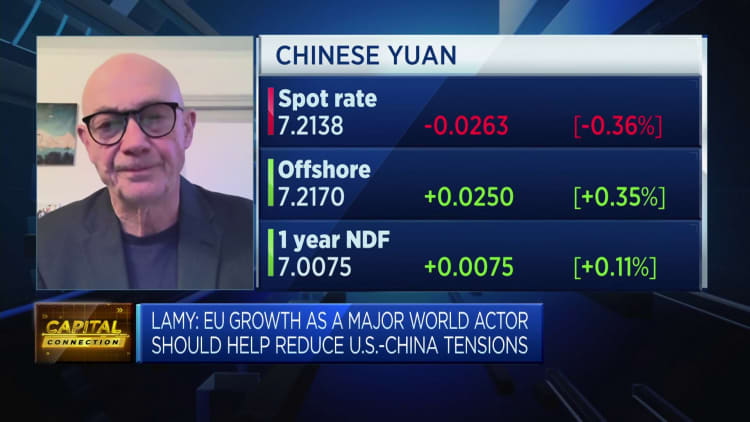The U.S. is now Germany’s biggest trading partner ahead of China

The flags of the U.S. and Germany are on the table at a bilateral meeting between German Economics Minister Habeck and U.S. Secretary of State Blinken at a hotel on the Gendarmenmarkt. Photo: Christoph Soeder/dpa (Photo by Christoph Soeder/picture alliance via Getty Images)
Christoph Soeder/dpa | Picture Alliance | Getty Images
After years of China being Germany’s main trading partner, the U.S. looks like it’s quietly taking that top spot as the year progresses.
Combined exports and imports between Germany and the U.S. totaled 63 billion euros ($68 billion) between January and March of 2024. Meanwhile, trade between Germany and China came to just below 60 billion euros, according to CNBC calculations. Reuters first reported the change on Thursday.
Several factors played a role in the move, Carsten Brzeski, global head of macro research at ING Research, told CNBC.
“This shift is the result of several factors: strong growth in the U.S. has boosted demand for German products. […] At the same time, decoupling from China, weaker domestic demand in China and China being able to produce goods it previously imported from Germany (mainly cars) reduced German exports to China,” he said.
China has been Germany’s biggest trading partner for years, but the gap between China and the U.S. narrowed in recent years. The U.S. has also long been a bigger market for German exports than China, Holger Schmieding, chief economist at Berenberg Bank, told CNBC.
While the U.S. share of German exports had been growing in recent years, China’s has been decreasing, he noted. “The Chinese economy is stuttering and German companies are facing stiffer competition from subsidised Chinese firms,” Schmieding said.
The key difference is that now the U.S. is also becoming more important when it comes to imports, he pointed out.

Germany has been pursuing a new China strategy, urging companies to “de-risk” from China last year. China is to remain a partner for Germany, the country’s government has stressed, and there should not be a “de-coupling” — but “systemic rivalry” has increasingly characterized the relationship between the two.
Tensions have also increased between the European Union and China, with the two launching investigations into each other’s trade practices and threatening to slap tariffs on imports.
Last month, a survey by German economic institute Ifo found that the amount of companies who say they are dependent on China fell from 46% in February of 2022 to 37% in February of 2024. This was linked to fewer companies relying on inputs from Chinese manufacturers, the report said.
“The fact that the U.S. has become Germany’s largest trading partner indeed illustrates changing trade patterns and the gradual decoupling from China,” Brzeski said.







